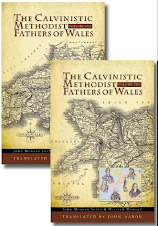The Banner of Truth have now published the never before translated Tadau Methodistaidd. These two massive volumes narrate the wonderful story of the amazing spiritual transformation that affected Wales between 1735 and 1850. Of particular value is the use the authors make of eye-witness accounts preserved in contemporary diaries, journals and letters. A truly exhilarating read!
The dust wrapper reads:
It was the French novelist Anatole France who, when feeling tired and discouraged, said, “I never go into the country for a change of air and a holiday. I always go instead into the 18th Century.” For an entirely different purpose, the great Welsh preacher, Dr Martyn Lloyd-Jones, frequently borrowed France’s words when speaking to his fellow Gospel preachers: “Go to the 18th Century! In other words read the stories of the great tides and movements of the Spirit experienced in that century. It is the most exhilarating experience, the finest tonic you will ever know. For a preacher it is absolutely invaluable … There is nothing more important for preaching than the reading of Church history and biographies.” His own biographer, Iain Murray, says that for “sheer stimulus and enjoyment there were no volumes which he prized more than Tadau Methodistiaid … the lives of the fathers of Welsh Calvinistic Methodism. They were constantly in his hands.”
These stimulating and enjoyable volumes narrate the exciting story of how Wales was spiritually transformed and the men whom God used to accomplish that great work. “The Lord gave the word: great was the company of those that published it” (Ps 68:11). In this first volume, which focuses on the revivals experienced in South Wales, we meet the well-known figures of Daniel Rowland, Howell Harris, William Williams of Pantycelyn; but within these wonderful pages are portraits of many lesser-known preachers such as Griffith Jones of Llanddowror, Howell Davies, Peter Williams, and David Jones of Llan-gan. What soon becomes evident in reading this fascinating history is the power of the Holy Spirit over congregations. From small beginnings in homes and farmhouses to great open-air gatherings of many thousands, the sermon became the foremost influence in the life of the nation. Whole neighbourhoods were turned upside-down and whole towns were subdued by the sense of God’s presence. The greatest concern of all at that time was the state of one’s soul before God. The great value of these volumes is the way they take up the words of those most involved in these remarkable events. In journals, diaries, letters and Association minutes they describe a wide range of Christian experience – conviction, repentance, faith and assurance, joy in the Holy Spirit, witness and testimony, conflict with sin and backsliding, restoration and perseverance – all are encountered and described with transparent honesty and humility. Preachers will also greatly value the many experiences here recounted in the work of preaching the gospel – above all the “demonstration of the Spirit and power”.
The first volume deals with South Wales and the second North Wales. In the Second volume two chapters (41 and 42, see pages 633-753) are given over to Elias. There are also a number of illustrations.
The English speaking world is indebted to John Aaron for his massive efforts in translating these fascinating volumes.






